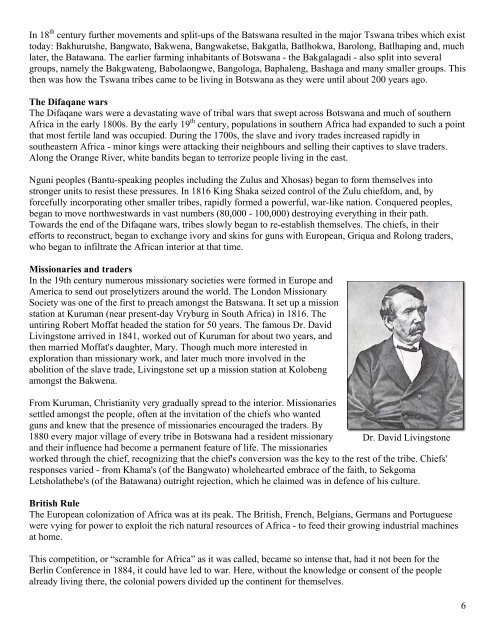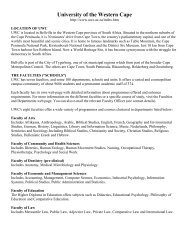UNIVERSITY OF BOTSWANA - Home
UNIVERSITY OF BOTSWANA - Home
UNIVERSITY OF BOTSWANA - Home
You also want an ePaper? Increase the reach of your titles
YUMPU automatically turns print PDFs into web optimized ePapers that Google loves.
In 18 th century further movements and split-ups of the Batswana resulted in the major Tswana tribes which exist<br />
today: Bakhurutshe, Bangwato, Bakwena, Bangwaketse, Bakgatla, Batlhokwa, Barolong, Batlhaping and, much<br />
later, the Batawana. The earlier farming inhabitants of Botswana - the Bakgalagadi - also split into several<br />
groups, namely the Bakgwateng, Babolaongwe, Bangologa, Baphaleng, Bashaga and many smaller groups. This<br />
then was how the Tswana tribes came to be living in Botswana as they were until about 200 years ago.<br />
The Difaqane wars<br />
The Difaqane wars were a devastating wave of tribal wars that swept across Botswana and much of southern<br />
Africa in the early 1800s. By the early 19 th century, populations in southern Africa had expanded to such a point<br />
that most fertile land was occupied. During the 1700s, the slave and ivory trades increased rapidly in<br />
southeastern Africa - minor kings were attacking their neighbours and selling their captives to slave traders.<br />
Along the Orange River, white bandits began to terrorize people living in the east.<br />
Nguni peoples (Bantu-speaking peoples including the Zulus and Xhosas) began to form themselves into<br />
stronger units to resist these pressures. In 1816 King Shaka seized control of the Zulu chiefdom, and, by<br />
forcefully incorporating other smaller tribes, rapidly formed a powerful, war-like nation. Conquered peoples,<br />
began to move northwestwards in vast numbers (80,000 - 100,000) destroying everything in their path.<br />
Towards the end of the Difaqane wars, tribes slowly began to re-establish themselves. The chiefs, in their<br />
efforts to reconstruct, began to exchange ivory and skins for guns with European, Griqua and Rolong traders,<br />
who began to infiltrate the African interior at that time.<br />
Missionaries and traders<br />
In the 19th century numerous missionary societies were formed in Europe and<br />
America to send out proselytizers around the world. The London Missionary<br />
Society was one of the first to preach amongst the Batswana. It set up a mission<br />
station at Kuruman (near present-day Vryburg in South Africa) in 1816. The<br />
untiring Robert Moffat headed the station for 50 years. The famous Dr. David<br />
Livingstone arrived in 1841, worked out of Kuruman for about two years, and<br />
then married Moffat's daughter, Mary. Though much more interested in<br />
exploration than missionary work, and later much more involved in the<br />
abolition of the slave trade, Livingstone set up a mission station at Kolobeng<br />
amongst the Bakwena.<br />
From Kuruman, Christianity very gradually spread to the interior. Missionaries<br />
settled amongst the people, often at the invitation of the chiefs who wanted<br />
guns and knew that the presence of missionaries encouraged the traders. By<br />
1880 every major village of every tribe in Botswana had a resident missionary Dr. David Livingstone<br />
and their influence had become a permanent feature of life. The missionaries<br />
worked through the chief, recognizing that the chief's conversion was the key to the rest of the tribe. Chiefs'<br />
responses varied - from Khama's (of the Bangwato) wholehearted embrace of the faith, to Sekgoma<br />
Letsholathebe's (of the Batawana) outright rejection, which he claimed was in defence of his culture.<br />
British Rule<br />
The European colonization of Africa was at its peak. The British, French, Belgians, Germans and Portuguese<br />
were vying for power to exploit the rich natural resources of Africa - to feed their growing industrial machines<br />
at home.<br />
This competition, or “scramble for Africa” as it was called, became so intense that, had it not been for the<br />
Berlin Conference in 1884, it could have led to war. Here, without the knowledge or consent of the people<br />
already living there, the colonial powers divided up the continent for themselves.<br />
6



